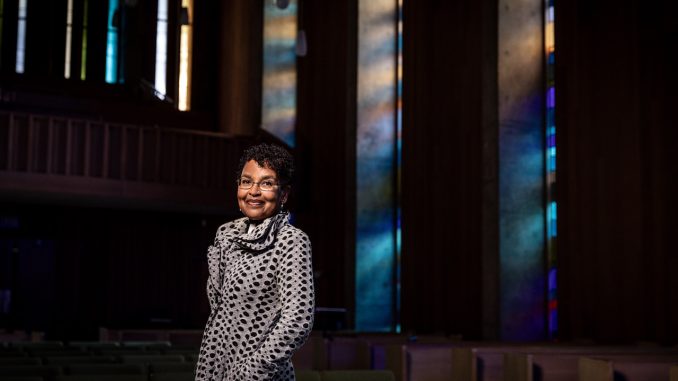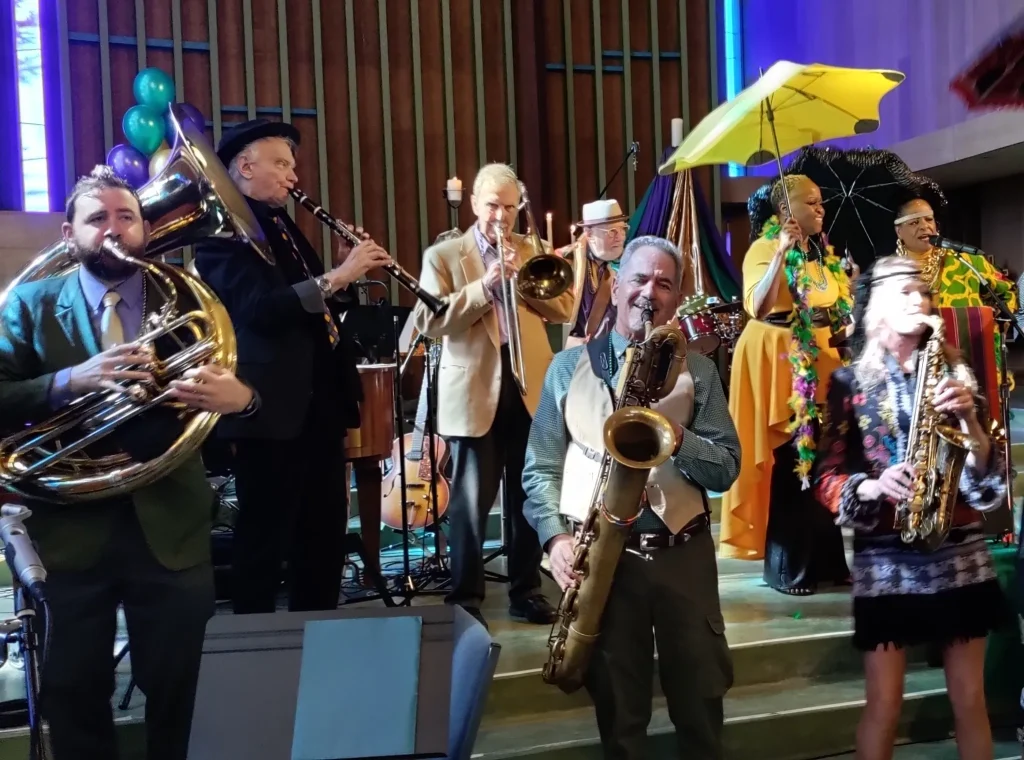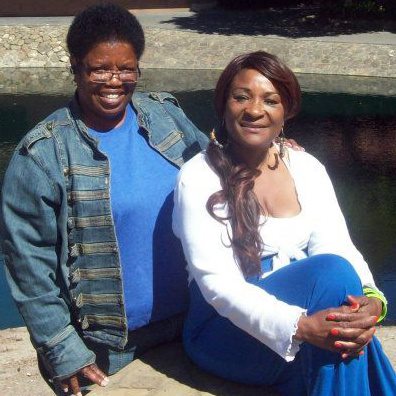
Editor’s Note: This article is published in partnership with Oaklandside.
A diverse group of mostly masked people had gathered by 11:00 a.m. on a Sunday in late February, many wearing multicolored beads and feathered leis. The Plymouth United Church of Christ, also known as Oakland’s “Jazz and Justice Church,” was holding a special service at its location in Grand Lake to celebrate Mardi Gras. An electric organist and an accordion player filled the simply-styled, tall-ceilinged church with upbeat, joyful music.
Plymouth UCC has held Mardi Gras services for about 20 years. According to the church’s pastor, Rev. Marjorie Wilkes Matthews (referred to by most parishioners as simply “Pastor Marjorie”), the Christian holiday and cultural event that signals the beginning of Lent is a time for people to consider what they want to change in their lives and seek a closer relationship with God.
At the start of the service, Matthews greeted the congregation of about 200 people of all ages, including babies, and many ethnic groups; an additional 75-100 attended on Zoom. After an opening prayer and the ringing of a meditation bell, Matthews invited everyone to rise and greet the Mardi Gras band and the choir.
“It’s time to let loose and let the Spirit in!”
From the back of the church, a long procession of musicians, choir members, pastors, and congregants, many dressed colorfully, came down the aisle, playing and singing “When the Saints Go Marching In.” The rest of the congregation began to join in, singing, clapping, and moving to the music. One little girl danced in the aisle, swishing her skirt from side to side.
Music in churches is common, but jazz of the sort that’s played and sung at Plymouth is less so. Although the church is small, it has a reputation for attracting excellent musicians, particularly jazz and blues musicians, and for serving a diverse community. Uplifting music is always present in the services, but there are days, such as Mardi Gras, that are especially vibrant.

Members are encouraged to be ‘justice makers’
It only takes one visit to notice the church’s jazz component and inclusivity. But perhaps less evident is its deep commitment to justice-focused initiatives. In recent years, the church has focused its energies and resources on campaigns to stop capital punishment, support a school-based community garden, and protect voting rights. The church is currently exploring how to build affordable housing on its property.
In her sermon, Matthews emphasized the connection between faith and justice.
“Some folks don’t like the look of freedom on other people. They don’t like the look of freedom on women; they don’t want women to have freedom over their bodies. Some people don’t like the look of freedom on queer people; they want queer people, especially trans people, to go back into the closet. Some folk don’t like the look of freedom on Black people, and brown people, and immigrant people, and Islamic people,” she said.
“But the scripture says, ‘Where the spirit lies, there is…,’” she added. And the congregation replied in unison, “Freedom!”
In an interview, Matthews explained how the church’s view of justice is grounded in scripture. “If you read what we consider the four gospels in our New Testament, it’s so clear that Jesus was doing justice work. He was upending these systems that oppressed the poorest, the most vulnerable among us,” she said. ”So that’s our understanding of who Jesus was and who we’re called to be. We’ve been called to be justice makers.”
The church’s justice agenda, said Matthews, is often driven by the chairperson of its justice ministry, who is selected by the congregation and serves for two years. When her husband, Rev. Bob Matthews, held the position, the church focused on capital punishment. Another chair focused on prison reform, and Matthews said the current chair has chosen to focus on protecting and expanding voting rights. The school-to-prison pipeline was another past focus, which led to a relationship with a local school that continues to this day.
“There was a season in the life of the church when we talked a lot about the school-to-prison pipeline and how to interrupt that,” said Matthews. “Through that work, we got connected to Hoover Elementary School in West Oakland. And we have continued in partnership with that wonderful little school for going on 10 years — it’s a third African American, a third Latino, and a third are families from Yemen. One of the things we helped the school to do was build a huge community garden to provide fresh produce because it’s one of those communities that’s a food desert.”
Marya, a relative newcomer to the church, said she was drawn to Plymouth by its strong community and diversity. “I found it here,” she said. “I did go to another church in Oakland, but that didn’t connect with me. It’s really beautiful here.” The music was another factor, she said. “Oh, my gosh, the music. It’s joyful. They celebrate people and love.”
Gayle Dunn, who is in her late 60s and has been coming to the church for 11 years, lives in Sacramento but was born and raised in Oakland. She’d taken the train into town to attend the Mardi Gras service. “This is my family,” she said.
We have a saying: ‘No matter where you are, who you are, or where you are on life’s journey, you are welcome here.’ We say that every Sunday.”
A complicated history: Plymouth didn’t always embrace diversity and justice
The church came by its name “Plymouth” due to the merger of two churches that were founded in the late 1800s and merged in 1904, Oak Chapel and Plymouth Avenue Church. According to Matthews, there are many churches in the UCC denomination with the name “Plymouth.” The UCC was founded in 1957 and was a merger of four different denominations, the largest of which was the Congregational Church, which had Pilgrim and Puritan roots in 17th and 18th-century New England.
The Plymouth Church in Oakland was not always justice-centered. When the church first opened, it was on Howe Street in the Piedmont neighborhood. A former church historian and an elder in the congregation relayed much of the church’s history to Matthews, who is African American and was born in the south Los Angeles neighborhood of Watts, though she has lived in Oakland for many years.
“In the late 1950s, the church decided to sell the building on Howe Street and was approached by an African American congregation that wanted to buy the building,” said Matthews. “The leadership of Plymouth Church at that time declined to sell the building to a Black church. It would have been perfect for their needs, but instead, they sold it to Kaiser.” In 1958, said Matthews, the health organization then tore down the building to make room for a parking garage.
Matthews said that today, during a time of racial reckoning in her church, the congregation has come back to that story and is in the process of atoning and making reparations for the church’s former act of racial bias.
“We’ve asked ourselves, ‘What is a meaningful way to atone for that part of Plymouth Church’s history?’ We’d always heard the good stories: This church stood against the internment of Japanese Americans (during World War II). So we were thankful that we had this church elder who had shared some deeper truths.”
One of the actions the church is currently exploring, said Matthews, is how to build affordable housing on its property at a time “when housing is so expensive in the Bay Area…when the African American population in Oakland is declining…when there are so many homeless people on our streets.” But doing so will be complicated, she added, since the church sits right on the border of Oakland and Piedmont, which means the church will have to work with two cities to gain the necessary approvals.
The joyfulness of the church’s services is particularly important now, Matthews said. “There is so much that can frighten us, that can immobilize us. But most of the time, if you come into our church, what you’ll experience is joyfulness and gratitude,” she said. “And we think it is important to cultivate those things in times like these. That is a form of resistance and it helps us to imagine a more hopeful future.”
At the end of the Mardi Gras service, Matthews announced, “We’re going to dance our way out!” and that is what happened. The band played their instruments with gusto and led the choir, pastors, and congregants out into the sunshine.
+ + +
More about Plymouth United:
- Located at 424 Monte Vista Ave., Oakland
- You can find more information about the church, including a brief history here
- In-person worship is at 11:00 a.m. on the 1st and 3rd Sundays of the month. The service is available every Sunday on Zoom at 11:00 a.m.
- The Mardi Gras service can be watched here
- The next special service will be Pentecost Sunday on May 28, which is also Memorial Day weekend.
- Rev. Rhina Ramos works with Spanish-speaking congregants. Services are held at the church and Latinx immigrants are welcome. More info.
- Part of the inclusivity of the church is its welcome of LGBT people. According to Pastor Marjorie, about half of the congregation is LGBT
- The church hosts Monday night jazz sessions on most 2nd and 4th Mondays
Katharine Davies Samway has lived in Oakland for over 35 years. She is a long-term educator — a teacher, a researcher, a teacher educator, a professor of education.




Delightful article! Love the Mardi Gras focus!! Intersting history of the church. I remember seeing and hearing Pastor Marjorie at the West County Detention Center some years ago! Great lady! Great focus! Many thanks for the uplifting article!